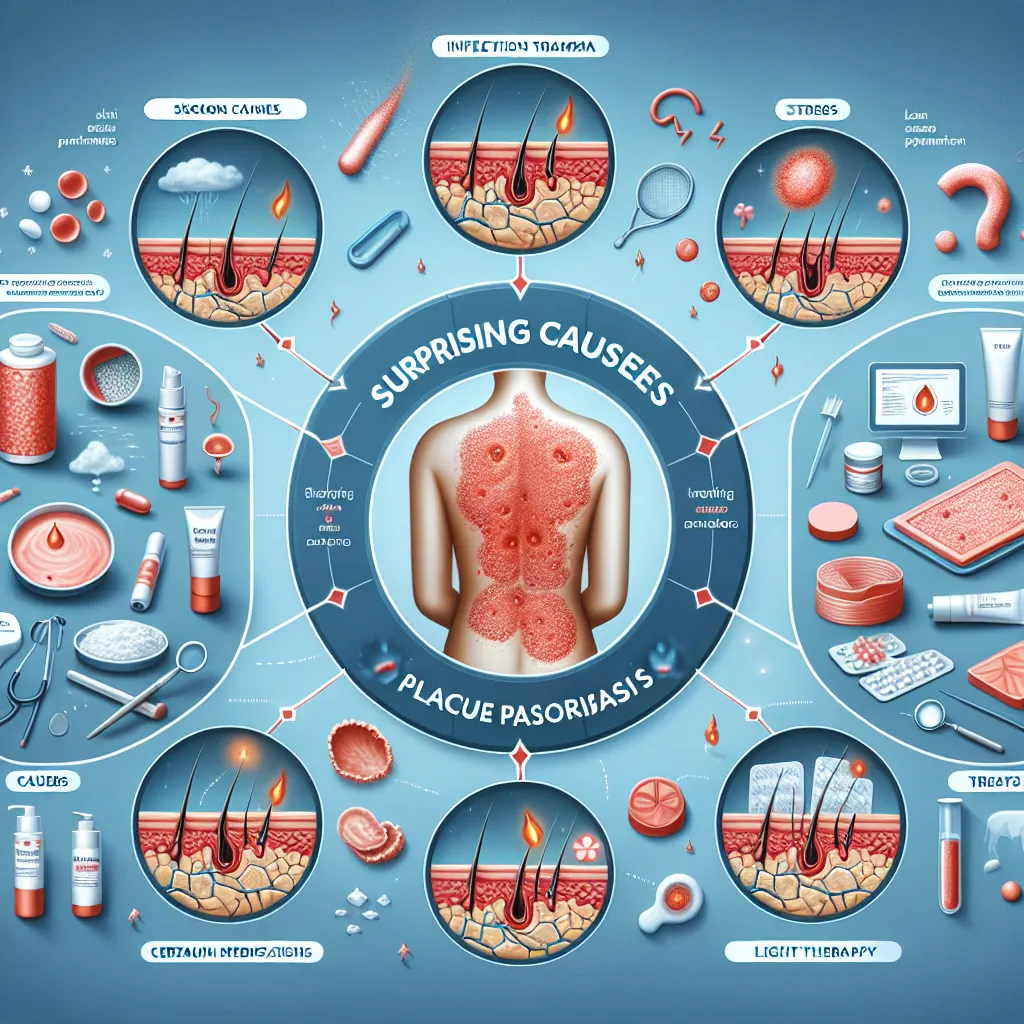The Most Surprising Causes of Plaque Psoriasis (see Treatments and Signs)
The Most Surprising Causes of Plaque Psoriasis (see Treatments and Signs)
Psoriasis is a chronic autoimmune condition that affects millions of people worldwide. It is characterized by the rapid buildup of skin cells, leading to the formation of thick, red, and scaly patches known as plaques. While the exact cause of plaque psoriasis remains unknown, there are several surprising factors that have been linked to its development. In this article, we will explore these causes, along with common treatments and signs of plaque psoriasis.

Genetics
One of the most surprising causes of plaque psoriasis is genetics. Research has shown that individuals with a family history of psoriasis are more likely to develop the condition themselves. In fact, it is estimated that about one-third of people with psoriasis have a relative who also has the condition. Certain genes, such as HLA-Cw6, have been identified as potential contributors to the development of plaque psoriasis.
Stress
Stress is another surprising factor that can trigger or worsen plaque psoriasis. High levels of stress can disrupt the immune system, leading to inflammation and potentially triggering a psoriasis flare-up. Additionally, stress can cause changes in certain immune cells that play a role in the development of psoriasis. It is important for individuals with psoriasis to manage their stress levels through relaxation techniques, exercise, and seeking support from loved ones.
Infections
Infections, particularly those caused by certain bacteria or viruses, have been associated with the development or exacerbation of plaque psoriasis. Streptococcal infections, such as strep throat, have been linked to the onset of guttate psoriasis, a type of psoriasis characterized by small, drop-like lesions. It is believed that the immune response triggered by these infections can lead to the development of psoriasis in susceptible individuals. Proper hygiene and prompt treatment of infections can help reduce the risk of psoriasis flare-ups.
Medications
Some medications have been found to cause or worsen plaque psoriasis in certain individuals. These include certain antimalarial drugs, beta-blockers used to treat high blood pressure, and lithium, a medication used to treat bipolar disorder. If you have psoriasis, it is important to discuss your condition with your healthcare provider before starting any new medications to minimize the risk of triggering or worsening your symptoms.
Smoking and Alcohol Consumption
Smoking and excessive alcohol consumption have both been linked to an increased risk of developing plaque psoriasis. Studies have shown that individuals who smoke are more likely to develop psoriasis and experience more severe symptoms compared to nonsmokers. Similarly, excessive alcohol consumption has been associated with an increased risk of psoriasis, particularly in men. Quitting smoking and moderating alcohol consumption can help reduce the risk of developing or worsening psoriasis symptoms.
Obesity
Obesity has emerged as a surprising risk factor for plaque psoriasis. Research has shown that individuals who are overweight or obese are more likely to develop psoriasis, and those with existing psoriasis may experience more severe symptoms if they are obese. The exact link between obesity and psoriasis is not fully understood, but it is believed that adipose tissue releases certain chemicals that promote inflammation, potentially triggering or worsening psoriasis symptoms. Maintaining a healthy weight through a balanced diet and regular exercise can help manage psoriasis symptoms.
Treatments for Plaque Psoriasis
While there is currently no cure for plaque psoriasis, several treatment options are available to manage and alleviate its symptoms. These include:
- Topical treatments: Creams, ointments, and lotions containing corticosteroids, vitamin D analogs, retinoids, or coal tar can help reduce inflammation and slow down the excessive skin cell growth.
- Phototherapy: Exposing the affected skin to controlled amounts of natural or artificial ultraviolet light can help reduce inflammation and slow down skin cell growth.
- Systemic medications: For severe cases, oral or injected medications that suppress the immune system, such as methotrexate, cyclosporine, or biologics, may be prescribed.
- Lifestyle modifications: Managing stress levels, maintaining a healthy weight, quitting smoking, and moderating alcohol consumption can help reduce the frequency and severity of psoriasis flare-ups.
Signs of Plaque Psoriasis
Plaque psoriasis is characterized by the following signs and symptoms:
- Thick, red patches of skin covered with silvery scales
- Dry, cracked skin that may bleed
- Itching, burning, or soreness in the affected areas
- Pitted nails or separation from the nail bed
- Stiff and swollen joints in some cases (psoriatic arthritis)
If you notice any of these signs or symptoms, it is important to consult a dermatologist for an accurate diagnosis and appropriate treatment.
Conclusion
Plaque psoriasis is a complex condition influenced by various factors, some of which may come as a surprise. Understanding the potential causes, such as genetics, stress, infections, medications, smoking, alcohol consumption, and obesity, can help individuals better manage their condition and reduce the frequency and severity of flare-ups. If you suspect you have psoriasis or experience any of the signs and symptoms mentioned, seek medical attention for proper diagnosis and personalized treatment options.
